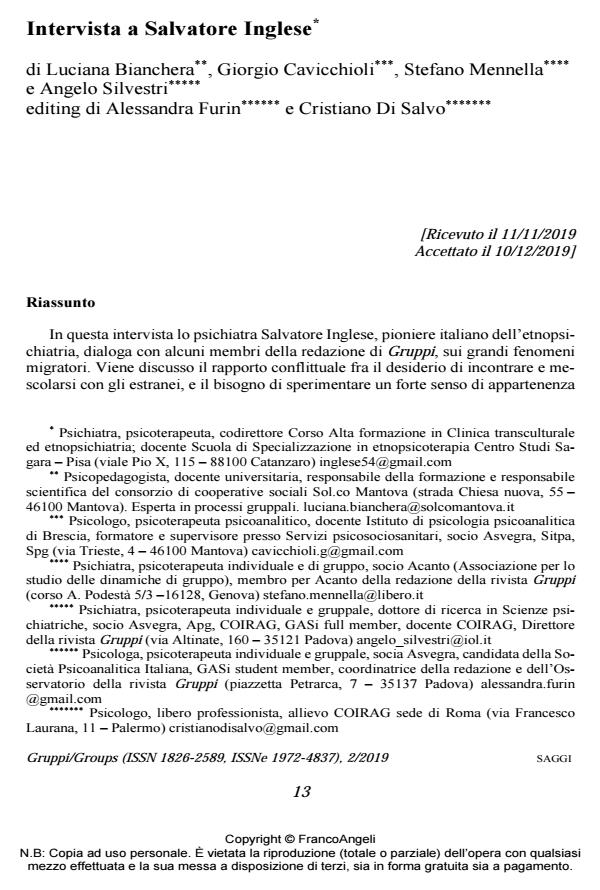An interview with Salvatore Inglese
Journal title GRUPPI
Author/s Luciana Bianchera, Giorgio Cavicchioli, Stefano Mennella, Angelo Silvestri, Alessandra Furin, Cristiano Di Salvo
Publishing Year 2020 Issue 2019/2
Language Italian Pages 19 P. 13-31 File size 188 KB
DOI 10.3280/GRU2019-002002
DOI is like a bar code for intellectual property: to have more infomation
click here
Below, you can see the article first page
If you want to buy this article in PDF format, you can do it, following the instructions to buy download credits

FrancoAngeli is member of Publishers International Linking Association, Inc (PILA), a not-for-profit association which run the CrossRef service enabling links to and from online scholarly content.
In this interview Salvatore Inglese, an Italian psychiatrist and a pioneer of eth-nopsychiatry, discusses the current, international migration phenomenon with some members of the Gruppi editorial board. Various issues are approached, such as the conflict between the wish to meet and mingle with strangers and the need to experience a strong feeling of belonging, guaranteed by well-defined borders and traditions. If experiencing a conflictual feeling when meeting a foreigner is una-voidable and accepting to take care of his/her needs inescapable, then ethnopsy-chiatry is very much at the forefront when trying to face the unbridgeable differ-ence between the parties involved. The very theoretical assumptions of Western clinical practice and psychopathology are therefore questioned, and special con-sideration is given to those who are directly involved in offering assistance to im-migrants in the welcoming communities. As far as theoretical assumptions are concerned, Salvatore Inglese deals with three further subjects: the unconscious and the group, which are seen as natural elements, and the therapeutic setting, which is described as a well-defined element which can highlight and dynamize the relationship between the two former elements. Special reference is made to Georges Devereux’s and Tobie Nathan’s works when discussing how linguistic dif-ficulties influence the setting arrangement. As for providing care to caregivers, rel-evance is given to the necessary effort to bear with the feeling of "estrangement" which is experienced when trying to cast a bridge between diversities that are dif-ficult to reconcile.
Keywords: Cultural psychiatry, Anthropology, Migrations, Ethnopsychiatry, Stranger, Uncanny.
- Freud S. (1892-1899). Progetto di una psicologia. OSF, 2. Torino: Bollati Boringhieri.
- Girard R. (1972). La violenza e il sacro. Milano: Adelphi, 2008.
- Inglese S. (1995). L’inquieta alleanza tra psicopatologia e antropologia. Ricordi e riflessioni da un’esperienza sul campo. San Giovanni in Fiore: La Ginestra.
- Inglese S. e Cardamone G. (2010). Déjà vu. Tracce di etnopsichiatria critica. Paderno Dugnano: Ed. Colibrì.
- Inglese S. e Cardamone G. (2017). Déjà vu 2. Laboratori di etnopsichiatria critica. Paderno Dugnano: Ed. Colibrì.
- Jabès E. (1991). Libro sull’ospitalità. Milano: Raffaello Cortina.
Luciana Bianchera, Giorgio Cavicchioli, Stefano Mennella, Angelo Silvestri, Alessandra Furin, Cristiano Di Salvo, Intervista a Salvatore Inglese in "GRUPPI" 2/2019, pp 13-31, DOI: 10.3280/GRU2019-002002